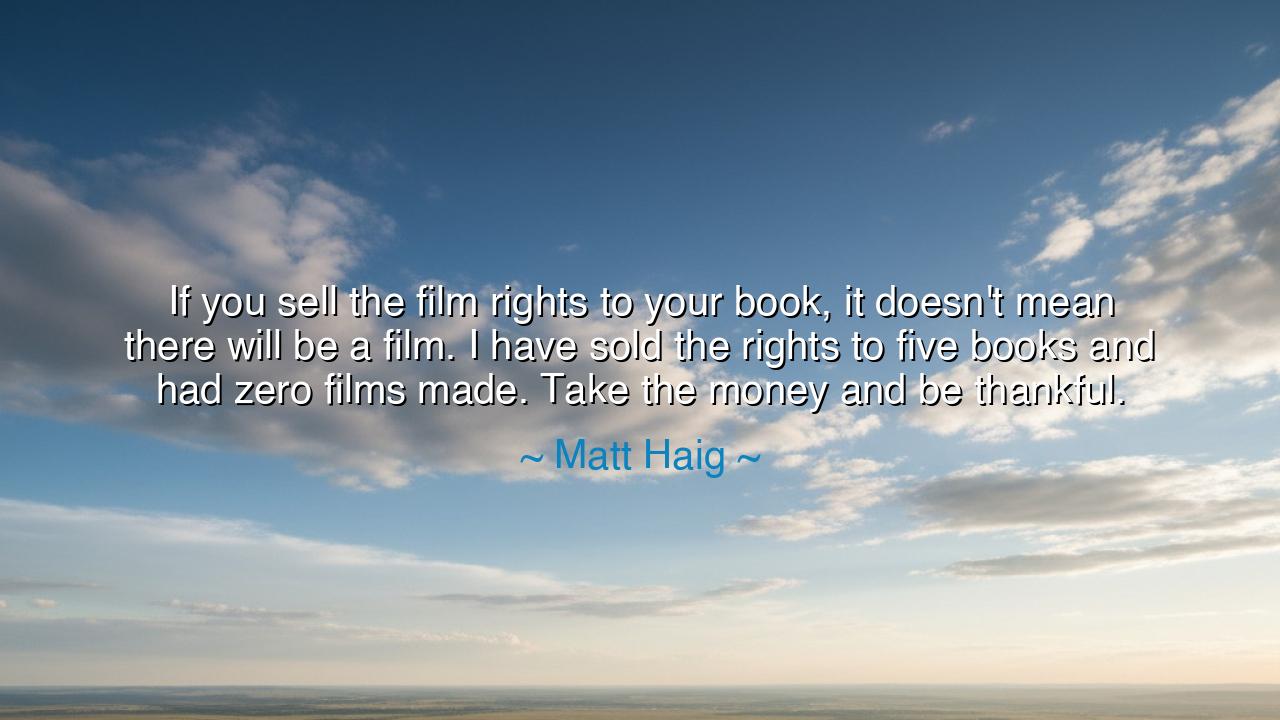
If you sell the film rights to your book, it doesn't mean there
If you sell the film rights to your book, it doesn't mean there will be a film. I have sold the rights to five books and had zero films made. Take the money and be thankful.






In the words of Matt Haig, storyteller of our age, we are reminded of the fragile dance between dreams and reality: “If you sell the film rights to your book, it doesn’t mean there will be a film. I have sold the rights to five books and had zero films made. Take the money and be thankful.” These words are not bitter but wise. They reveal the gulf between expectation and fulfillment, and they teach us to embrace gratitude even when the greater vision remains unfulfilled. To be thankful for what is given, rather than lamenting what is withheld, is the mark of one who understands the nature of fortune.
The film industry, like many realms of art, is unpredictable. Promises are made, contracts are signed, yet countless projects vanish into silence. Haig, through his own experience, has learned the truth: that to sell the rights of a story does not guarantee its rebirth upon the screen. This gap between possibility and reality has broken the hearts of many, but Haig’s wisdom is to take joy in what is certain—the reward already in hand—and not to mourn what may never come.
This lesson resounds with the ancient wisdom of Epictetus, the Stoic philosopher, who taught that we cannot control external outcomes, only our responses to them. When we cling to hopes that lie beyond our power, we suffer. But when we accept the gifts that life offers, however small, we find peace. Just as Epictetus counseled men to be content with what they hold, Haig counsels the artist to rejoice in the blessing of opportunity, rather than curse the silence of unrealized dreams.
There is also in these words a call to pragmatism. To “take the money and be thankful” is not cynicism, but wisdom. For in the uncertain worlds of art, fortune often comes in unexpected forms. Perhaps the film is not made, but the resources gained may fund the next book, the next story, the next act of creation. Gratitude for the portion given allows the artist to continue the journey, while bitterness over what was withheld can only poison the spirit.
Haig’s words also warn against the danger of illusion. Many dream that the sale of rights is the gateway to glory, that the book will inevitably live again upon the screen, immortalized for all. But he unmasks this illusion with honesty, reminding us that expectation without reality leads to despair. The wise soul tempers hope with acceptance, dreams with groundedness, and thus avoids the sting of disappointment.
The lesson here is timeless: do not measure success only by what has not yet come. Instead, measure it by what has already been given. For gratitude turns small victories into great treasures, while ingratitude turns even great victories into ashes. The artist, the worker, the dreamer—each must learn to honor what is present, even as they strive for what is beyond reach.
Practically, this means cultivating contentment in progress. When opportunities come, receive them with joy, even if they do not unfold as you once envisioned. Do not despise the partial gift because it is not the whole. Use what is given to build further, to dream anew, to continue your craft with energy rather than despair. For every seed sown, even if it does not grow as expected, nourishes the soil for future harvests.
Thus the wisdom of Matt Haig shines: “Take the money and be thankful.” Behind the humor of the phrase lies the ancient truth of acceptance. Life rarely gives us exactly what we imagine, but it often gives us enough. The choice is ours—to complain over what was withheld, or to rejoice in what was granted. In gratitude lies peace, and in peace lies the strength to create again.






AAdministratorAdministrator
Welcome, honored guests. Please leave a comment, we will respond soon